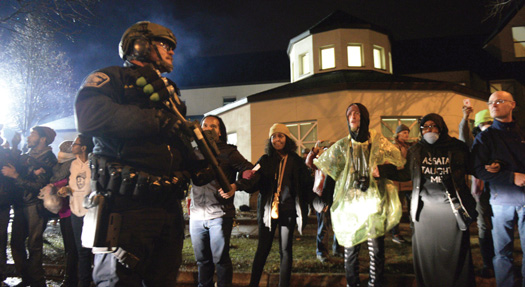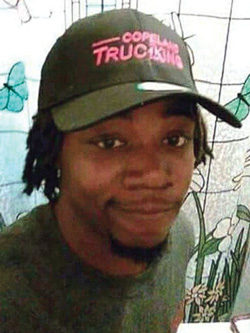Minneapolis shooting exposes police, racism in the Twin Cities say leaders and activists
By Brian E. Muhammad -Contributing Writer- | Last updated: Nov 25, 2015 - 8:58:21 AMWhat's your opinion on this article?

A Minneapolis police officer maintains a barricade outside the Minneapolis Police Department’s Fourth Precinct building in Minneapolis on Nov. 18. Protesters camped outside the building after the fatal shooting of an unarmed Black man by a Minneapolis police offi cer on Nov. 15. Jamar Clark, 24, was shot in the head and died at a hospital the next day. Protests started within hours as some neighbors said Clark had been handcuffed when he was shot, which contradicted statements by the Minneapolis police. Photo: AP Wide World Photos
|
The police deny he was handcuffed when shot and the community and his family are demanding answers.
According to reports, Mr. Clark was suspected of assaulting his girlfriend who needed medical assistance for an injured ankle. He allegedly tried to hinder emergency responders from aiding her Nov. 15 and police were called to the scene.
What exactly happened next and how the call ended with a police bullet in Mr. Clark is murky. Mr. Clark survived a day on life support but died Nov. 16 in the hospital after his family removed him from life support, the Minnesota Bureau of Criminal Apprehension told the press. The Hennepin County Coroner’s Office released its autopsy report Nov. 17. It said Mr. Clark died from a “gunshot wound of the head” and “manner of death is homicide” and the Minnesota Bureau of Criminal Apprehension, a statewide investigative agency, and the Federal Bureau of Investigation are looking at the shooting.

Jamar Clark
|
“That means that the mayor and the governor and the chief of police and the (police) union chair … (must) have integrity with the process,” she said. On one hand authorities claim they cannot talk about the case, but on the other officials are quick to say Mr. Clark was not handcuffed and was shot while reaching for the cop’s firearm, Ms. McKnight added.
Minneapolis Mayor Betsy Hodges announced along with an independent investigation by the state agency that she requested a review by the Justice Department Civil Rights Division and U.S. Attorney Andrew Luger’s office for Minnesota.
“I made this request because I believe that that is the best way to build confidence in the process for everyone involved and concerned,” Mayor Hodges posted on her official FaceBook page.
The shooting ignited a chaotic scene of shouting and angry bystanders who believed Mr. Clark was handcuffed before police opened fire on him.
In the days afterward, activists and some residents protested, held prayer vigils, formed an encampment near the Four Police Precinct, and dramatically shutdown Interstate 94 with clashes between Minneapolis police and protestors.
According to media reports, over 50 people were arrested.
The killing has become an increasingly volatile issue for Minneapolis—a diverse city made up of Whites, 70,000 Blacks and a sizable mixture of Latino, Asian and East African immigrants.
The Minnesota Bureau of Criminal Apprehension said the two officers involved, Mark Ringgenberg and Dustin Schwarze, have worked in the department for 13 months and have been police officers for seven years. Both were placed on routine paid administrative leave after the shooting.
Authorities said no police dash-cam or body cameras recorded the shooting, but added that there are several fragmented videos of the incident. None of the footage is being released while the investigation is active, said Minnesota Bureau of Criminal Apprehension Superintendent Drew Evans.
Ms. McKnight was not pleased with a police union representative’s statement that he was confident the state agency investigation would show the officers’ actions were justified.
The Police Officers Federation has stood by the police account from the beginning. Critics say their position is a consistent practice of police unions throughout the country when disputed deaths of citizens occur at the hands of police officers.
“So this hillbilly, Ku Klux Klan language and behavior is already setting the environment for injustice; it keeps fueling the fire,” argued Ms. McKnight.
Others warned the national trend of police shootings of unarmed people followed by uprisings from fed up communities could come to the Twin Cities.
“We were Ferguson before Ferguson,” remarked Spike Moss, a longtime freedom fighter and Black nationalist leader. “Folks didn’t know we have been catching hell longer than anybody,” he told The Final Call, referring to race relations in the city.
“We’ve been saying for a long time that Minneapolis was one bullet away from Ferguson. Well, that bullet was fired last night,” said Jason Sole, an associate professor at Metropolitan State University and a member of the local NAACP, to the local Star Tribune Newspaper.
Similar to other places across the country, the Minneapolis police department has had an antagonistic relationship with the Black, Brown and Red communities.
An October 2014 American Civil Liberties Union report on Minnesota policing revealed a culture that fostered serious racial disparities on how policing is conducted among Blacks and Whites in Minneapolis. “The Department is not meeting its Constitutional duty to protect and serve everyone equally and fairly,” said Emma Andersson, an ACLU staff attorney in the report.
The Minneapolis Police Department’s own data, as reported to the Federal Bureau of Investigation’s Uniform Crime Reporting, reveals that between 2004 and 2012, a Black person was, on average:
• 8.86 times more likely to be arrested than a White individual for disorderly conduct;
• 7.54 times more likely to be arrested than a White individual for vagrancy;
• 16.39 times more likely to be arrested than a White juvenile for curfew/loitering.
“These arrests are largely subjective and therefore prone to the abusive exercise of officer discretion,” said Charles Samuelson, executive director of the ACLU-MN in a statement about the report.
In a letter to Mayor Hodges and Police Chief Harteau, the ACLU said it’s police actions resulting in Black “distrust” toward law enforcement and that Blacks are “unfairly targeted, marginalized, and saddled” with arrest records for low-level nonviolent offences.
In the immediate aftermath of the killing, a coalition of pastors and imams gathered around the Clark family in prayer and support. It was an “outpouring of love and diffused a lot of anger they had,” said Charles Muhammad who oversees the Nation of Islam Minneapolis Study Group. Mr. Muhammad said the solidarity of the group and about 40 men—many from the community—who “stood in the gap” between protestors and police helped stabilize a potentially explosive situation.
Nationally Jamar Clark becomes another name added to an ever growing list of police victims. According to “The Counted: People Killed by the Police in the U.S.,” an independent investigative reporting project by the London-based Guardian newspaper tracking such deaths, over 1,000 people were killed to date in 2015.
Although there is a new pilot program in the Dept. of Justice, until recently the U.S. government published no comprehensive record of people killed by police, even after a series of controversial deaths pushed public demands for data on the subject, said the Guardian.
Thirty-two percent of 135 Blacks compared to just 15 percent of 234 Whites killed by police were unarmed, showing Blacks were more than twice as likely to be killed than Whites in this circumstance as of June, the report said.
“Black folks like me have known for a long time that the police do not always represent safety for us and that an encounter could be deadly,” said Brittany Packnett to The Guardian. “But having these statistics that add to our personal stories should continue to move everyone towards wanting to (have) a part in correcting this.” Ms. Packnett is a member of President Barack Obama’s taskforce on 21st century policing and a founder of the Campaign Zero movement dedicated to eradicating police violence in America.
Some local leaders working with the community in the streets are calling for the federal government to place the Minneapolis police department in receivership, in fulfillment of a past agreement they say was reneged on.
“They should have been put in receivership a long time ago; this stuff has been going on forever and a day,” said Rev. Jerry McAfee, pastor of New Salem Missionary Baptist Church, where organizing meetings were held. “What we have been trying to do … with some of the brothers from the (Nation of Islam) and brothers from the block is deal with the violence ourselves,” said Rev. McAfee. If “some of the stuff we do to ourselves” can be handled within “that ought to diminish their desire to come in and do stuff in our community,” he said.
What needs to be understood is, it’s not about whether Mr. Clark committed a crime or if he was handcuffed or not when shot, said Mr. Moss. It’s battling the actions of White supremacy “to lynch our people as … judge and jury and executioner,” he said. “We’re not fooled that the new rope is a gun.”
“We already won the victory of making them tell us who the officers were. We found out that these are lateral officers,” said Mr. Moss. The two officers involved were part of a “lateral system” where cops get moved to other precincts even in other states when caught in wrongdoing or corruption, he charged.
“Both of these guys were pushed from somewhere else—one as far as San Francisco and both of them have pasts … of doing something to people on the street,” Mr. Moss added.
Mr. Clark’s killing is part of a bigger problem of American racism where the victim gets criminalized, he continued.
Mr. Moss blasted attempts to expose past juvenile records of Mr. Clark as hypocritical in a country guilty of both domestic and international crimes.
“We’re not hung up about the crime … that you keep giving his record. We’re hung up that you never give the record of the United States of America towards people of color. You want to give his record of what he did as a child. What about your record of what you did to the Red man, the Black man, the world, all people of different colors and different religions?” he asked. “You got a record, let’s expose yours.”
INSIDE STORIES AND REVIEWS
-
-
About Harriett ... and the Negro Hollywood Road Show
By Rabiah Muhammad, Guest Columnist » Full Story -
Skepticism greets Jay-Z, NFL talk of inspiring change
By Bryan 18X Crawford and Richard B. Muhammad The Final Call Newspaper @TheFinalCall » Full Story -
The painful problem of Black girls and suicide
By Charlene Muhammad -National Correspondent- » Full Story -
Exploitation of Innocence - Report: Perceptions, policies hurting Black girls
By Charlene Muhammad -National Correspondent- » Full Story -
Big Ballin: Big ideas fuel a father’s Big Baller Brand and brash business sense
By Bryan Crawford -Contributing Writer- » Full Story






 Click Here Stay Connected!
Click Here Stay Connected!








